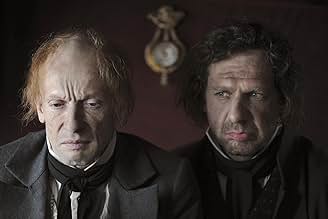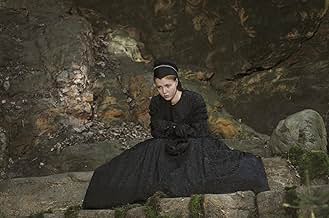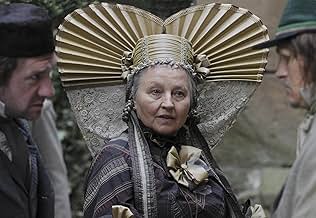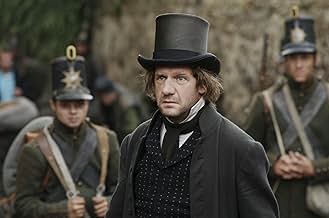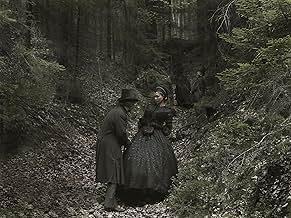CALIFICACIÓN DE IMDb
6.5/10
5.9 k
TU CALIFICACIÓN
Un erudito desesperado vende su alma a Satanás a cambio de una noche con una hermosa joven.Un erudito desesperado vende su alma a Satanás a cambio de una noche con una hermosa joven.Un erudito desesperado vende su alma a Satanás a cambio de una noche con una hermosa joven.
- Dirección
- Guionistas
- Elenco
- Premios
- 15 premios ganados y 27 nominaciones en total
Eva-Maria Kurz
- Faust's Cook
- (as Eva Kurz)
Opiniones destacadas
Best watched late on a sleepless night when you feel at the end of your tether. Like a nightmare that I couldn't wake from, this and a glass of scotch took the edge off my own bewildered existence. It needs several viewings to begin to get to the bottom of whatever it is trying to say about fallen man, but I am sure it is not a message of hope. As a piece of filmmaking I found it hard to fault. It transported me to an unknown, lost world that suggested Dark Ages Germany seen through an alchemist's green bottle spun faster and faster on some infernal machine. I am unlikely to forget this world even if I may be reluctant, for now, to revisit it. On another dark night perhaps.
"Wohin?" "Dahin"
The movie opens with the Herr Doktor cutting open a rotting corpse, declaring that he has looked for man's soul and has found that there is none.
The scene is a microcosm of the film's despairing vision of modern man's immorality, descended into seeing all as mere material. In this world, the old moral code remains only in debased form: good does not exist but evil does. The film's aesthetic is ruled by filth, and everyone's body seems either decaying or malformed (bodies are all they are).
And so too has Faust's famous bargain with the devil been seriously downgraded. Goethe's Faust was foolish but noble: he signed his soul away for knowledge, a mirage of human perfectibility. Sokurov's Faust signs his off without so much as a second thought - and for what? So little! A bit of money and a bit of ass. All here is only bestial (and fleeting) pleasure. There is no longer even a dream of something better. All are selfish, mean and disgusting, loving no one, not even themselves. The film is a nightmarish verdict on modern man: he has given up the better part of himself to live like an animal, and in the end does not even realize what he has done. We the viewer are left to wonder whether there ever was a 'better part' of us at all. However, the one character who seems to recognize the fallen state of things is Faust's father, perhaps an indication that the old generation could still see the devil for what he is. Hardly hopeful, but maybe a sign that modern man's crass materialism and selfishness is not the whole story.
Compared to an aesthetic depiction of something like The Portrait of Dorian Gray, by Oscar Wilde, also a story of corruption, this ugly, often grotestque film, loosely based on Goethe´s Faust, is disappointing. It was a slog to get through because it was so drab and disgusting. Dust and darkness everywhere. Gross, deformed characters. Filth, misery, poverty, disease. Rats. Altogether quite unpleasant to watch. Still, I have to say that the director succeeds in creating a film as depressing as its subject: the corruption of a human being and the selling of his soul.
Aleksandr Sokurov's take at Faust is a courageous act. Yet, my issues with this movie have nothing to do with the discussion whether a Russian director might understand the essence of Goethe's work. This is a futile debate, because Sokurov comes closer to Goethe than an average Westerner to Russian classics, as displayed in Joe Wright's Anna Karenina (2011).
In Faust, Sokurov did what he's done before. There are rather realistic, almost documentary images and there are dream-like sequences. We've seen the former in, for example, the trilogy of Moloch (1999), Taurus (2001) and The Sun (2005). And we've seen the latter in, for example, Russian Ark (2002) and Alexandra (2007). So what went wrong?
Again, i'm expressing my views here and won't try to judge Sokurov's talents and abilities. In Faust we kick off with the daily work of Dr. Faust and progress toward the space beyond reality. Whether it is a higher plane of existence or main character's hallucination is left unclear, yet it portrays well his inner state, triggered by malnutrition and selling the soul. Personally, at a certain point i found this movie difficult to watch...
In Faust, Sokurov did what he's done before. There are rather realistic, almost documentary images and there are dream-like sequences. We've seen the former in, for example, the trilogy of Moloch (1999), Taurus (2001) and The Sun (2005). And we've seen the latter in, for example, Russian Ark (2002) and Alexandra (2007). So what went wrong?
Again, i'm expressing my views here and won't try to judge Sokurov's talents and abilities. In Faust we kick off with the daily work of Dr. Faust and progress toward the space beyond reality. Whether it is a higher plane of existence or main character's hallucination is left unclear, yet it portrays well his inner state, triggered by malnutrition and selling the soul. Personally, at a certain point i found this movie difficult to watch...
The way Sokurov treats this story makes it clear that his characters are all immersed in the day tot day doings, the earthly aspects of our lives, and it is hard or even impossible to escape. He brings it home to us, he gets us involved through his camera and sound, Faust becomes us. The first time I know of that this story was told in such a way that we can actually get inside Faust. Sokurov brings home some intriguing themes. Is Faust's soul maybe already missing from the start? What is our perception of Faust's hell and/or heaven, and how easy are we manipulated? We don't seem to need a lot of arguments and talking to win us over...
¿Sabías que…?
- TriviaIt won the Golden Lion award at the 2011 Venice Film Festival. It is the 3rd Russian film to be crowned best film in Venice, after Ivan's Childhood (1962) and The Return (2003).
- ConexionesFeatured in At the Movies: Venice Film Festival 2011 (2011)
- Bandas sonorasSalve Regina
(uncredited)
Gregorian chant
Selecciones populares
Inicia sesión para calificar y agrega a la lista de videos para obtener recomendaciones personalizadas
- How long is Faust?Con tecnología de Alexa
Detalles
- Fecha de lanzamiento
- País de origen
- Sitios oficiales
- Idioma
- También se conoce como
- Faust
- Locaciones de filmación
- Productoras
- Ver más créditos de la compañía en IMDbPro
Taquilla
- Presupuesto
- EUR 8,000,000 (estimado)
- Total en EE. UU. y Canadá
- USD 58,132
- Fin de semana de estreno en EE. UU. y Canadá
- USD 10,030
- 17 nov 2013
- Total a nivel mundial
- USD 64,556
- Tiempo de ejecución2 horas 20 minutos
- Mezcla de sonido
- Relación de aspecto
- 1.37 : 1
Contribuir a esta página
Sugiere una edición o agrega el contenido que falta


